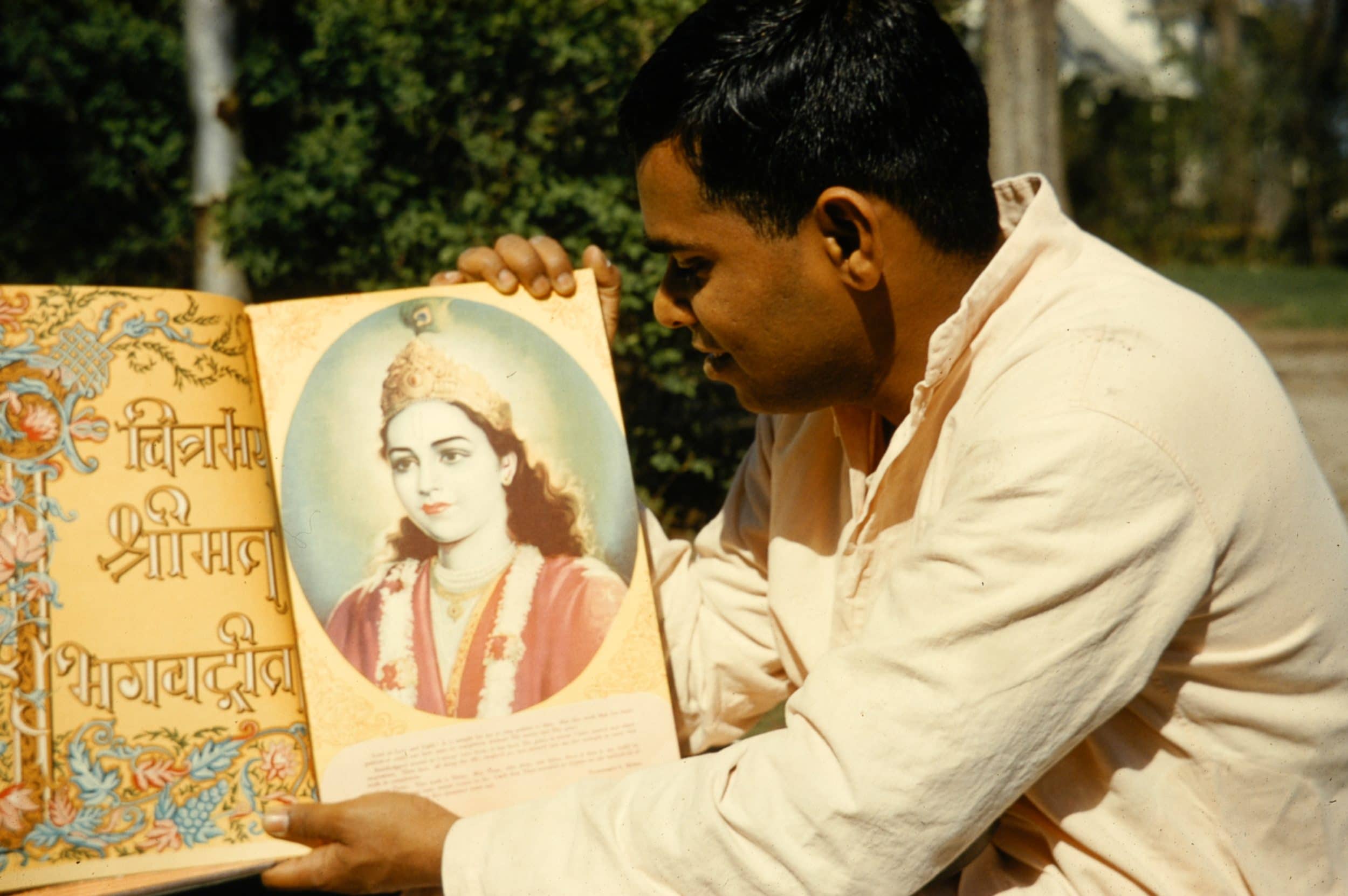Sivananda Bahamas Blog
Expand Your Horizons …
Our Blog
Bhakti Yoga: The Surest Way to God, Part 1
By: Swami Swaroopananda
Introduction: The Nature of Bhakti
Bhakti is devotion to God. Its nature is intense love towards God, the Beloved or towards the Guru. It is of the nature of Divine attachment. It is a type of attachment that does not bind but liberates, because it is attachment to God, and God is within us. God is not an external object to which we get attached. Rather, He is our own Self, our Innermost Reality. Bhakti is real, it is powerful, and it is of the nature of Bliss. Yet, it is also of the nature of pain, as one of its modes is experiencing the pangs of separation from the beloved. This is a sweet, divine pain that is considered the highest form of Bhakti. Bhakti Yoga is a very potent system of yoga. Its centerpiece is extraordinary intense love that is directed towards God and is experienced by the practitioner.
Bhakti is primarily generated by purification of the heart and the mind through the practice of Karma yoga or selfless service to our fellow beings. This purification leads to meditation, and through meditation our mind becomes steady and one-pointed. Once the mind is pure, steady and one-pointed, we can meditate on Iswara, the Lord. Through this meditation we come to a point where we experience the Reality of Iswara. When we experience the reality of Iswara, Bhakti emerges.
In the practice of Bhakti Yoga, the aspirant becomes the lover and Iswara becomes the beloved. Eventually, through this process of love, the lover and the beloved become one. Bhakti is this process of union through love. Grace is a main principle in the path of Bhakti yoga because everything that we receive in this path comes from Grace. One of the best ways to attain this Grace is satsanga, or association with saints. Bhakti Yoga is a path of service - service of saints, service of the Guru and service of our fellow beings. Through this service, blessings and Grace are invoked and the result is Divine Love. Bhakti Yoga is a very beautiful yoga; it purifies the mind of its impurities and gives birth to the yoga of knowledge or Jnana yoga, which removes ignorance and leads to Moksha or spiritual liberation.
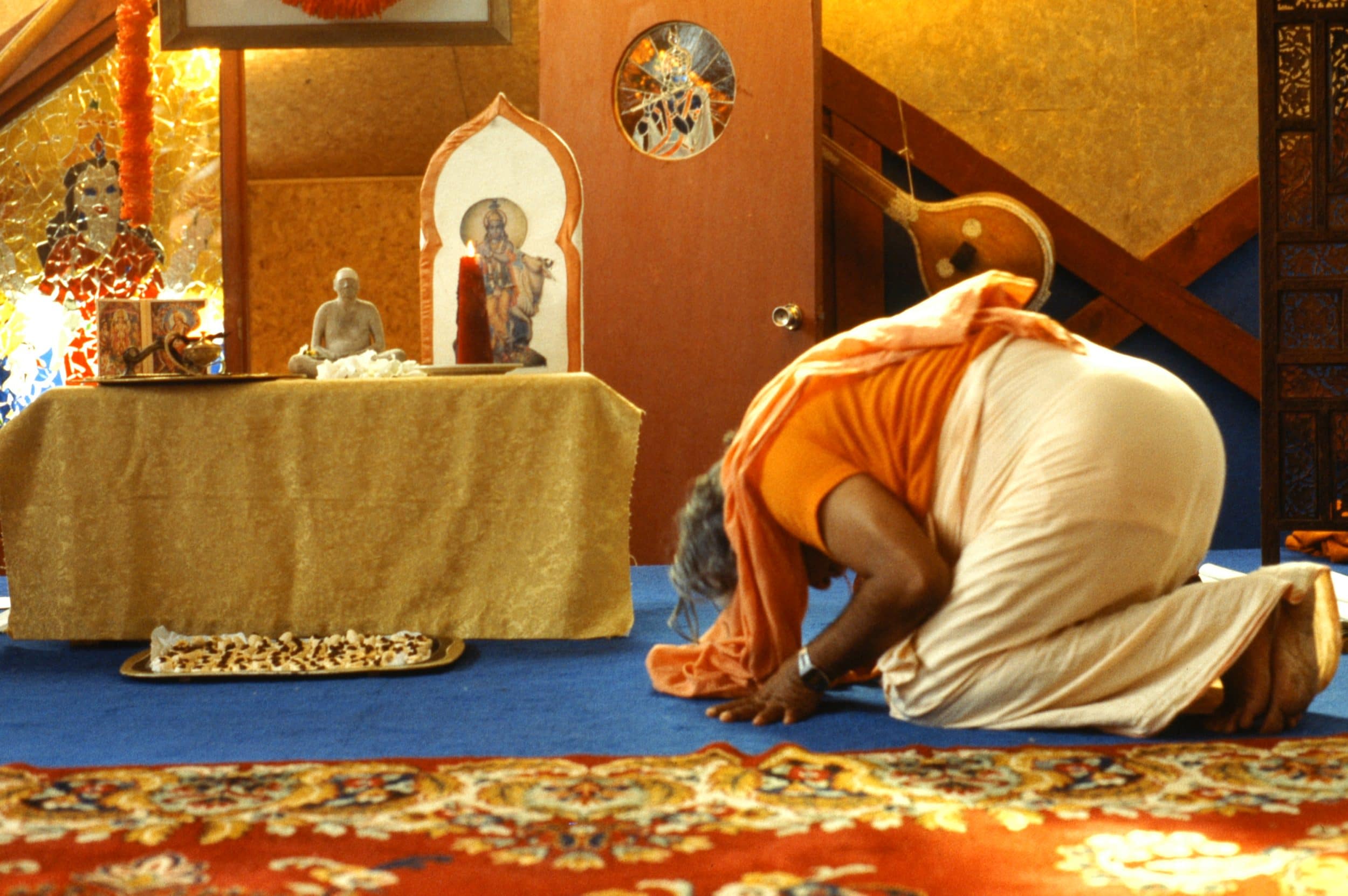
Who is God?
Bhakti is Supreme, one-pointed devotion directed towards Iswara, or God. According to the yogic scriptures, Iswara is the One that includes within Himself the All. In the Eleventh Chapter of the Bhagavad Gita, Lord Krishna shows to Arjuna His Cosmic Form. Within this Cosmic Form Arjuna sees everything - all universes, all creations, all beings, all kingdoms of nature - past, present, and future - all included in that one Being.
Iswara is the Absolute Reality in a process of manifestation. Within Him are the cosmic processes of creation, preservation and the dissolution of creation. In His essence, Iswara is Brahman - pure consciousness, all-pervading, transcendent, infinite life, existence, love and bliss. One can meditate on Iswara as the totality of everything that exists. But those who are unable to do this, meditate on Him in one of His aspects as Divine Father, Divine Mother, Divine Child, etc. When we meditate on Iswara and repeat His name the result of this meditation is Bhakti or Divine Love.
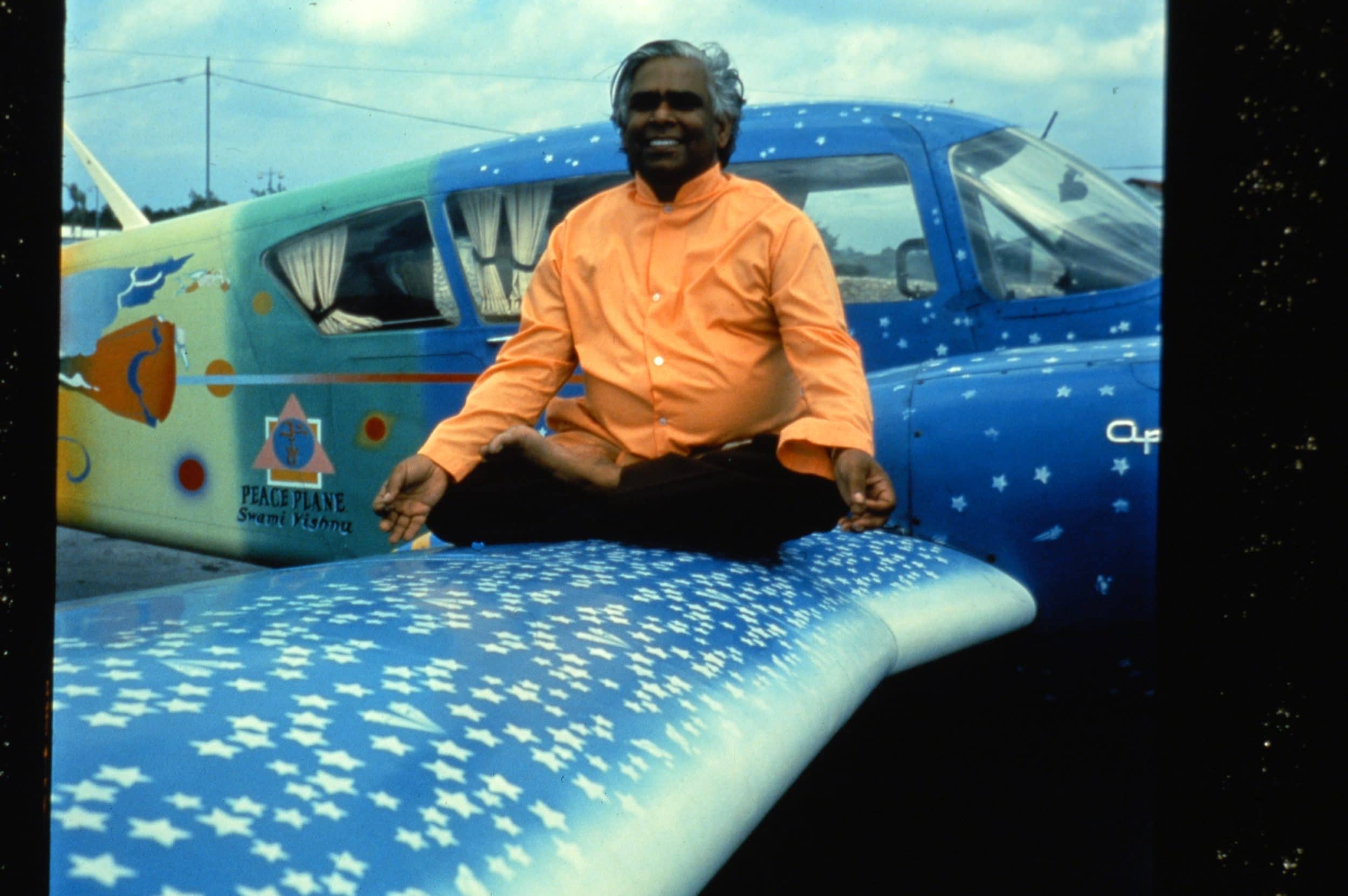
What is Love?
Love is a Divine attribute; it is of the nature of immortality, it is of the nature of Ananda or absolute Divine Bliss, it is ecstatic by nature, it is the Divine essence that permeates pure awareness or pure consciousness. Love is the Ground of all Being, the Ground of Existence, it is that thing which keeps everything together, it is the force that is responsible for creation, preservation and dissolution of creation.
Love is identical to the Atman or Self, as it is identical to Iswara or God. It is inexpressible, but it can be experienced. Love is the power that destroys duality, because it is a force through which the two become one. Love is the great attractor; it is that thing which attracts us to search and to find our Essential Nature. Love is irresistible; when we hear its call, we cannot resist it and we are attracted to the source of this call of love until we merge in it so the two become one - the lover and the beloved unite.
Love is contagious; when a person is in a state of divine love or divine ecstasy, those who are in his or her presence enter a similar state because of their association with that Bhaka or lover of God. Love spreads very fast, it is all-powerful, it can overcome everything; it can overcome darkness and all negative traits. It is the key for meditation; without it we cannot truly meditate. We breathe it, we eat it, we are made of it, it sustains us, it unites us, it shows us the truth of Unity in Diversity, we merge in it and in the end, it destroys us in the highest sense.
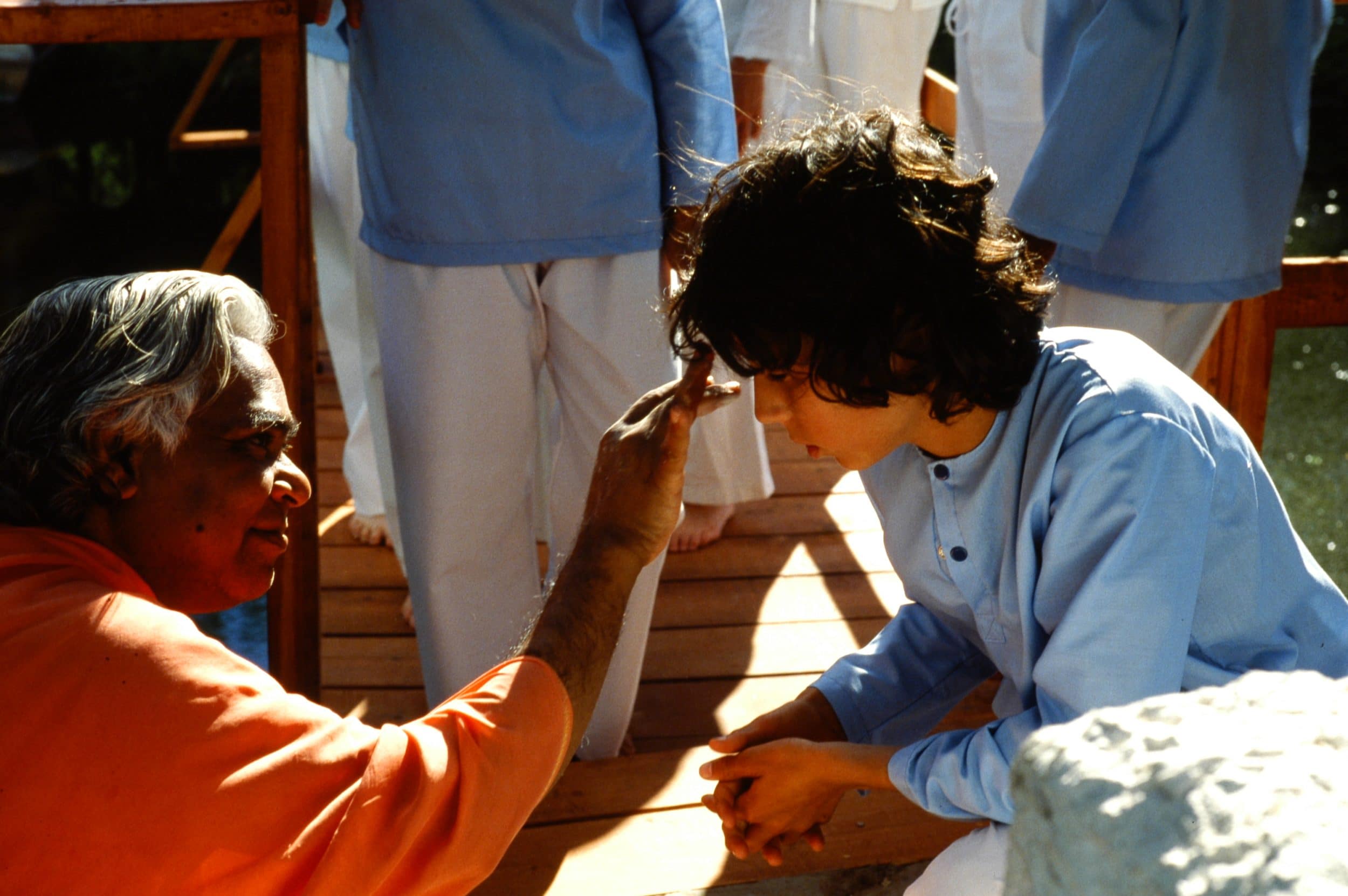
Love and Non-Attachment
Vairagya or non-attachment is an important principle in the path of yoga. Does this mean that we should be indifferent and non-loving? To the contrary. When we are attached to objects or people, there can be no real love. Vairagya means ‘acting without selfish desires.’ When we truly love, ultimately, we want nothing for ourselves, only for the other. When we reach that selfless state, we become free. Vairagya means freedom from desires which are based on egoistic motivation. It means acting out of love, desiring nothing for ourselves, not even appreciation. The joy is just in serving and loving the other.
In the Narada Bhakti Sutra Narada Muni says: “Bhakti is its own fruit”. When you have Love, you have the highest reward. What else can you want? When we experience Love, all our desires are immediately fulfilled, we have everything. To be non-attached does not mean to be indifferent. Precisely because we are not attached, all our will is dedicated to giving, loving, embracing humanity, and sacrificing our entire life for others. If we want nothing for ourselves, we are rich. The easiest way to find love is to stop thinking about ourselves and to focus on the needs of others, as Mother Theresa said: “Service is love in action.”
It is a mistake to equate love with attachment. The nature of love is bliss; the nature of attachment is suffering and pain. The things to which we are attached by nature change and pass away. We also change and pass away. If I am attached to chocolate, with time, my teeth may go bad and even my capacity to taste, smell and see the chocolate may diminish. Or I may get diabetes and the chocolate will become a source of pain and destruction for me. Similarly, if I am attached to a person, this will also bring suffering because both myself and the person to whom I am attached constantly change and eventually will pass away in one way or another.
Before you go to sleep tonight, make a list of all your attachments, then meditate on this list and ask yourself, “how many more attachments would I like to have?” One attachment is one shackle; two attachments are two shackles; a thousand attachments are a thousand shackles. Do we really want to be slaves to our attachments? We can be attached to alcohol, to people, to food or to money. These are all kinds of addictions, and addictions bring pain and suffering. Love is the exact opposite. By its very nature it is full of bliss, joy and freedom. Love frees us from bondage and therefore yogis believe in love and practice Bhakti Yoga - the yoga of love.
Some people find it difficult to love, but if they practice, love will come. Once the heart and the mind are purified, love will manifest. It is not a matter of belief. It is a matter of direct experience.
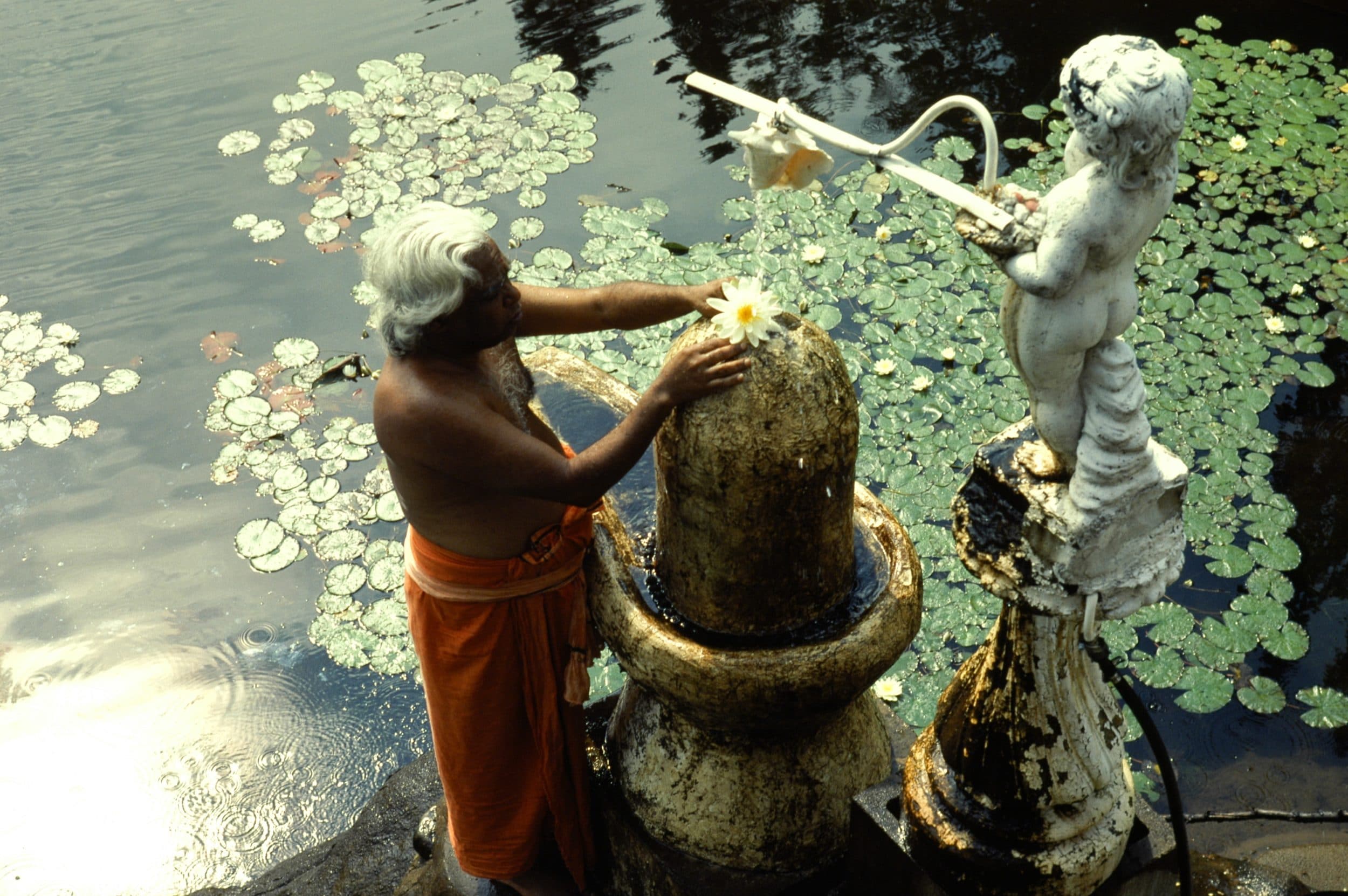
Cultivating a Relationship with God
People relate to God in many ways. Some relate to the Divine in an abstract way, without name and form while others relate to the Divine in a personal form. There are people who do not believe in God, but they believe in the Atman or Self. Some are skeptics or atheists, but even they believe in something. They believe in truth, in that which cannot be denied. If God is truth, then the skeptics and even the atheists believe in God. When the Dalai Lama was asked if he believed in God, he replied: “some people say that God is love. If God is love, then I believe in God”.
There are many other ways to relate to God. We can relate to God as Divine Father, Divine Mother, Divine Child, etc. The way in which we relate to the Divine is called our Ishta Devata or chosen deity. How do we cultivate our relationships with God or the Ishta Devata? It is just like in any other relationship. When two people are in a relationship and they wish to cultivate it, the first thing they need to do is to spend time with each other. Similarly, when you have a relationship with God you need to spend time with God. How do we spend time with God? We do this through meditation or through devotional practices. We can pray to God, talk with God, meditate on God, quarrel with God, etc. The most important thing is to spend time together with our beloved.
When you really love someone, you cannot stop thinking about your beloved. When you cannot stop thinking about God, this is called meditation. According to Swami Sivananda, meditation that stops when you raise up from your seat is not real meditation. Real meditation goes on when you sit, walk, lie down, eat and so on, because when you have a real loving relationship with the Divine, whatever you do, you cannot stop thinking about your beloved.
When you speak to little children about falling in love they do not understand, but if you speak to them about playing with toys, they do understand. Similarly, to beginners on the path we have to say: ‘wake up in the morning, go to the satsang hall, meditate for half an hour, chant, do yoga asanas, etc.’ This is like playing with toys. Beginners need these reminders because they are not mature enough to understand the meaning of love. But when we mature, we fall in love with God. Then we need no reminders because all we want to do is to meditate and to be in the presence of our beloved; we have an intimate relationship with God and we know what it is, nobody needs to tell us.



